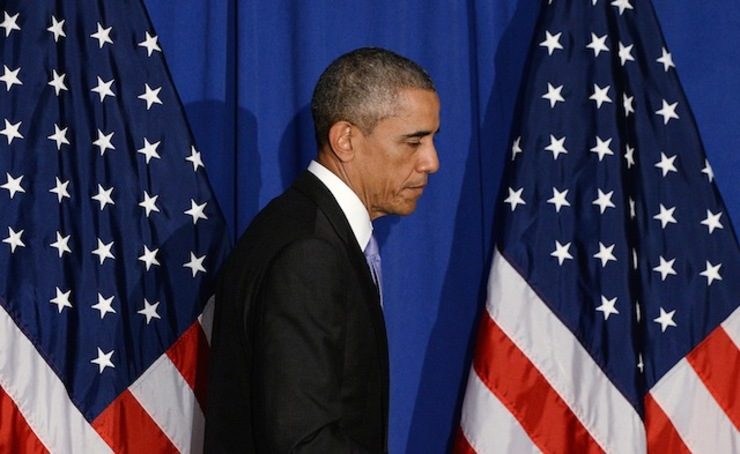SUMMARY
This is AI generated summarization, which may have errors. For context, always refer to the full article.

WASHINGTON DC, USA – Six years after sweeping into the White House on the slogan “Yes We Can,” Barack Obama, whose Democratic party has lost control of both houses of Congress, must now find a new can-do spirit.
Floundering in the polls and shunned by his own party’s candidates, as Obama moves into the final two years of his term his presidency seems a world away from the promise of his 2008 campaign.
In Tuesday’s (November 4) midterms Republicans seized control of the Senate and reinforced their majority in the House of Representatives, leaving the White House a lonely Democratic redoubt.
With eyes already turning to the 2016 vote to replace him, the US leader is saddled with an image problem and must show Americans he still has projects he can accomplish and battles he can win.
Meanwhile, he does not hide his frustration at roadblocks in Congress and his distaste for the political games he would need to play to make progress in Washington.
Obama is far from the only president to find himself stuck after a midterm vote with a Congress in the hands of the other party.
Dwight D. Eisenhower, Ronald Reagan, Bill Clinton and George W. Bush all ended up in the same awkward position in their final two years in office.
“We do have an obligation to work together on issues where we can agree,” the new Republican leader of the Senate, Mitch McConnell of Kentucky, said Tuesday night.
“Just because we have a two-party system doesn’t mean we have to be in perpetual conflict.”
House Majority leader John Boehner urged Obama to “begin the last two years of his presidency by taking some bipartisan steps.”
In a statement with an aggressive tone Boehner warned Obama against any “counter-attack” on the new Republican majority, but there seems to be little margin for cooperation.
Rice University historian Douglas Brinkley, had predicted a Congress led by Republicans means total paralysis on most legislation – but that could leave space for the man in the Oval Office.
“It’s going to be almost impossible to get anything done between the White House and Congress over the next two years,” he warned.
But, with the clock winding down, the president may feel freer to use his executive power more widely to push his agenda forward.
“Presidents are usually a bit more timid to use executive powers in their first term or even their first six years because you still dream of cutting a deal on Capitol Hill,” he explained.
“In many ways, he is going to be liberated, because Republicans do not want to do any business with him.”
It is difficult to imagine any major issues on which the Obama administration and a Republican-dominated Congress could find common ground.
Between now and his January 20, 2017 exit, Obama may make greater use of his so-called “pen and phone strategy” – using his pen for executive orders and his phone to mobilize outside groups.
The shift could become evident within weeks, over the highly controversial issue of immigration.
Making his mark
Obama has said he will act on immigration before the end of the year, arguing: “The American people don’t want me standing around twiddling my thumbs waiting for Congress to do something.”
An executive order could offer relief to some of America’s 11 million undocumented immigrants, many of whom have spent their lives in the United States under constant threat of deportation.
Obama’s supporters, impatient after previous delays, and his opponents, who argue it is unacceptable to bypass Congress on such an important issue, are awaiting the president’s next move.
Speaking Sunday, November 2, during a campaign rally for Connecticut’s Democratic governor, Obama was interrupted repeatedly by protesters denouncing deportations.
Responding, Obama expressed his frustration, but also expressing a certain powerlessness.
“We fought for immigration reform. It’s the other party that’s blocked it. Unfortunately, folks get frustrated, and so they want to yell at everybody,” he complained.
Without turning to Congress, Obama can use his final two years to build on his main legislative accomplishment: Obamacare, which makes health insurance available for millions of uninsured.
On the international front, two major crises – tensions in Ukraine fueled by pro-Russian separatists, and the advance of the Islamic State jihadist group in Iraq and Syria – could monopolize his time.
And he could see concrete results on three major negotiations: a nuclear agreement with Iran, a trans-Pacific free trade agreement; and a global agreement on climate change.
Each time, he must navigate a fine line with Congress, which he might be tempted to circumvent.
On climate any treaty must be ratified by two-thirds of the Senate, almost certainly impossible in the current political environment, but a different legal approach could allow Obama to avoid the obstacle.
Whether on domestic policy or on the international stage, historian Brinkley warns against the temptation to draw a conclusion either way on Obama’s legacy too soon.
“He still has two full years to distinguish himself,” Brinkley said. “He still has a quarter of his presidency ahead of him.” – Rappler.com
Add a comment
How does this make you feel?
There are no comments yet. Add your comment to start the conversation.